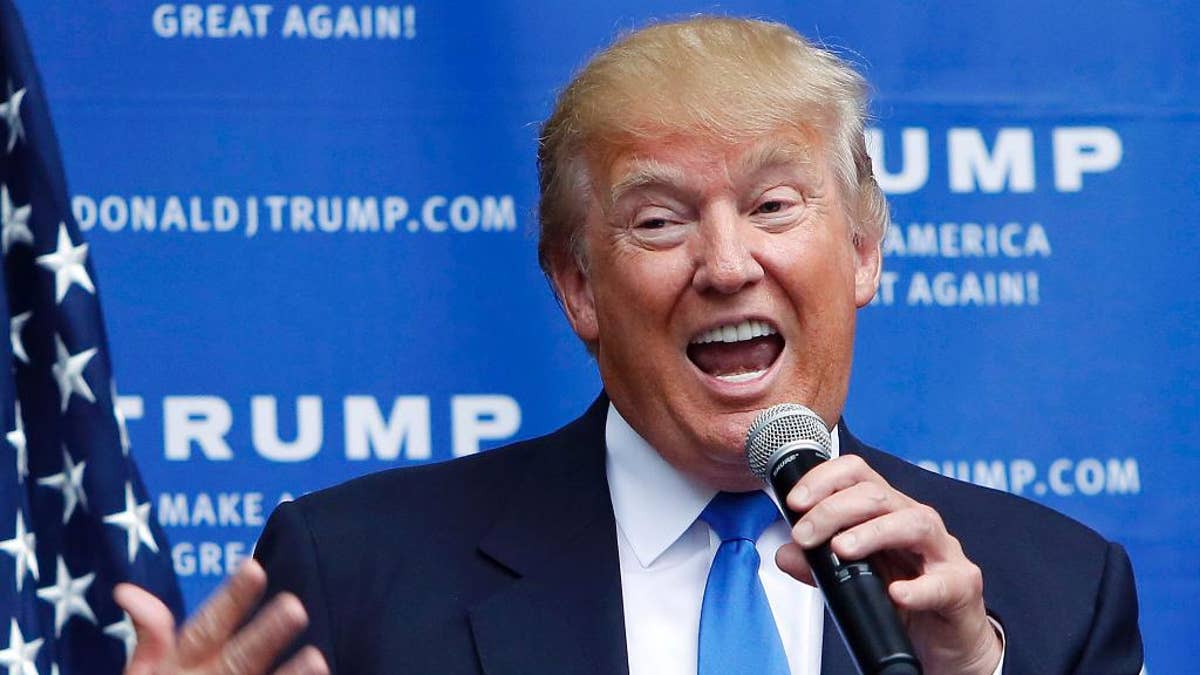
FILE - In this Tuesday, June 30, 2015, file photo, Republican presidential candidate Donald Trump speaks at a house party in Bedford, N.H. New York City officials are reviewing the city’s contracts with Trump after statements the GOP presidential hopeful made about Mexican immigrants. (AP Photo/Jim Cole, File) (The Associated Press)
When Donald Trump told an Iowa audience last week about Arizona Sen. John McCain that “I like people who weren’t captured,” while saying McCain was “not a war hero,” he created long-term trouble for his brand.
Reactions to his imprudent statements, made in an interview with Frank Luntz at the 2015 Family Leadership Summit, have been fast and furious from Republicans across the nation.
Texas Gov. Rick Perry tweeted: “Trump’s comments today make him unfit to be commander-in-chief”; Louisiana Gov. Bobby Jindal said, “After Donald Trump spends six years in a POW camp, he can weigh in on John McCain's service”; and South Carolina Sen. Lindsey Graham commented, “If there was ever any doubt that he should not be #GOP standard bearer, his growing mountain of stupid statements should end all doubt.”
Whether one agrees with him or not, it is clear that Trump is definitely exciting to watch and can sometimes be considered an entertainment brand. However, after this latest McCain faux pas, one would have to question whether he has the talent to be considered a serious political brand.
Very few would deny that Trump is skilled at generating attention. Let’s face it: he is the 21st century PT Barnum, getting us to pay attention to what he says on a variety of subjects, including politics. From this point on, political reporters and pundits will pay less and less attention to his political musing because, although entertaining, what Trump says has no real meaning in the political world as we know it.
Trump also has an additional issue -- his poll results.
The question that arises from anyone who has a basic understanding of statistics, polling methodology, and general campaign theory is: What are these polls measuring? The short answer is: popularity. It surely is not political voter behavior. These polls make for great copy and provocative discussions, but cannot fully gauge who will vote for Trump in a primary.
Consider this: Over the years, pre-primary election poll numbers often do not reflect primary voter behavior. You don’t have to go far to discover that Mississippi Sen. Thad Cochran managed to defeat his Tea Party challenger, Chris McDaniel, even though the polls indicated otherwise. And, those supposedly in the know thought that the Oklahoma Republican primary race between James Lankford, a two-term congressman, and state House Speaker T. W. Shannon would be a toss-up? The result was not a nail-biter—Lankford crushed Shannon with 57 percent of the vote in a three-way primary.
To better predict results, these pre-primary polls require a different methodology that more precisely predicts who will actually show up to vote in a primary or caucus. These activist voters who show up to vote for their candidates are referred to as prime voters by political consultant professionals. It is these folks who need to be tapped by pollsters across the country to get a statistically representative sample of what is going on within any political party and its regulars.
So Brand Trump has some matters to solve before moving on to its next event. Based on his business background, Trump just could pull it off. To do so, he must first realize that he must begin to see himself as a political brand and not a business brand.
Perhaps the 2012 GOP presidential candidate Mitt Romney, another successful business type, can give him some counsel. And who knows? If he listens to some astute political experts and takes their advice, things could change. It is always easier when you have marketing and branding in mind.
